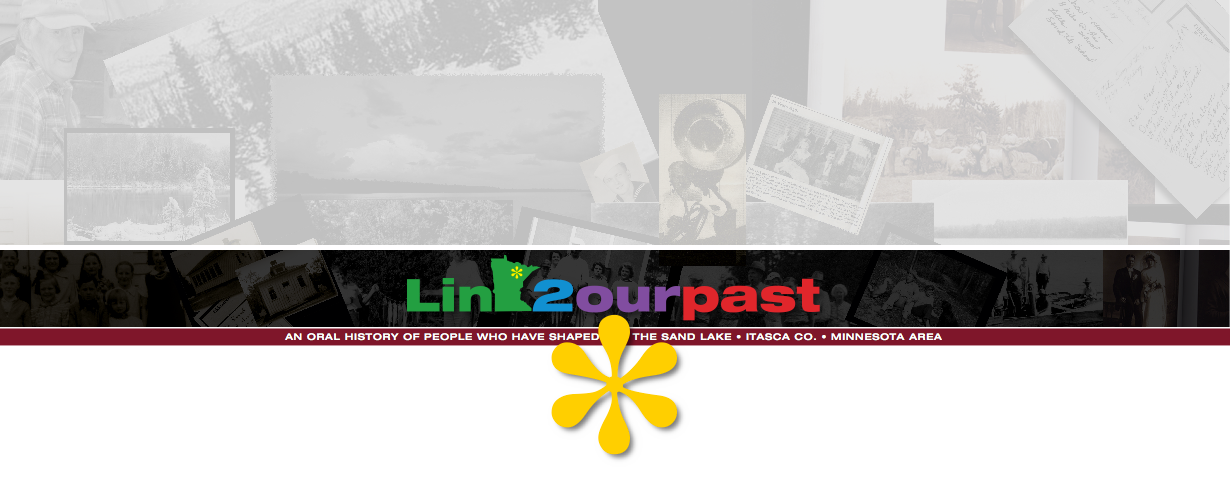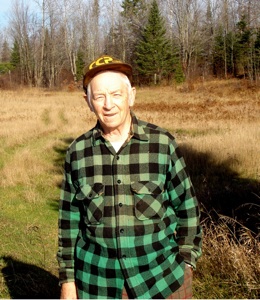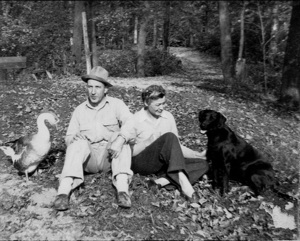Ames said, “If you didn’t catch it on a line, or you didn’t shoot it, or you didn’t raise it, you didn’t eat it.”



By Bernie Troje
The son of homesteaders, Byron Ames remembers clearly the Sand Lake area before paved roads, bridges, electricity and, of course, convenience stores. In fact, stores of any kind close by. Ames’ family was self-sufficient. Ames said, “If you didn’t catch it on a line, or you didn’t shoot it, or you didn’t raise it, you didn’t eat it.”
Their subsistence living, however, provided for the family quite well. Back in the woods, they had 55 cleared acres. He said, “Dad always made a big garden.” His mother did a lot of baking.
Ames’ mother spent much time preserving food. “Mother used to can,” Ames said, “nearly a hundred quarts each of string beans and then corn and tomatoes.” Canning was a delicate procedure. Ames says his mother had to be careful: “A draft would crack the canning jars when they were cooling.”
His father grew “potatoes, green mountains and russets (he also grew) a lot of cabbage. He would shred it and put it in large crocks. He had a big tamping stick…. He’d tamp it down real tight. Then he had boards and rocks he washed off and put on the crocks and set them in a place that was cool.”
In the summer the Ames had about 65 head of cattle. They were put out to pasture from early June to the last part of October. Ames said early in the season he’d “try to get [hay] out to them when they didn’t see ya. [If] they could smell it they would stampede.” Some were beef and the rest were milk cows.
In the winter, his dad harvested ice from the lakes and “put it up in 50 lb. sacks in the shed.” In the summer you’d brush the sawdust off the ice, “put a bunch of meat down on it and put more blocks down on the meat.” He said, “That meat would keep a long time.”
In the winter they closed off a large room in the house away from the heat. They poured the milk into large Karo Syrup containers (“We always used to have a lot of pancakes to eat,” he explained) and placed the containers in the cool room. “In that room the milk would freeze….. We waited until it got pretty thick scum on it. Then we’d pour it out, and we could eat that. It tasted just like ice cream to us.”

Ames reminisced they had three kinds of raspberries and even ground cherries then. And, “There was one thing there was lots of. That’s fish. We had some for smoking, some for baking, and some for fish chowder with potatoes and onions. Smoking,” he said, “it’s an all-day-long job.” They used “butter salt [for curing] from the creamery, [which is] not as strong as regular salt.”

Byron remembers “lots of bear but early on not many raccoon or deer.” There had been no raccoons up here, so when the first one was trapped, they didn’t know what it was. And, he added, “Civilization brought the deer. They’re crazy about cedar.”
He also remembers a particular moose his dad didn’t shoot because they “already had enough meat.”
Their dog, Barney, who “didn’t feel comfortable inside the house, burrowed in a hole in one corner of a haystack to stay out of the wind. That dog was all you needed,” Ames said, “to keep wild animals out of the garden.”

Ames said the first and second bridges across the Bowstring River at Anchor Inn were built before he was born. The second, he remembers because two cars “couldn’t meet on the bridge.” The current third bridge he thinks was built in the 1940’s.
Ames’ father passed in 1961. His mother died in 1983. Ames, of course, worked on the family farm, but he also was a trucker until he quit in 1991. Then he logged until 1997. Today Ames is retired on the family homestead. He lives in the family’s second home which was built in the 1940’s.
Byron Ames remembers fifty pound flour sacks, homemade currant jelly and minus 50 degree temperatures every other winter. His memories also add substance to reports of mob “activity” in the area: Al Capone visiting at what’s now Chapel Hill.
After our interview, Byron Ames was standing in the yard of his family’s homestead. As I was leaving he told me I should drive over the grass to get back on the driveway. I hesitated, but Ames kept waving me to back up. His parting words: “You don’t want to keep things you use too nice.”

OK kids...
it’s 30º below zero...
so NO SCHOOL TODAY!
Fred & Bea Eggars owned Chapel Hill Resort.

Byron Ames.

